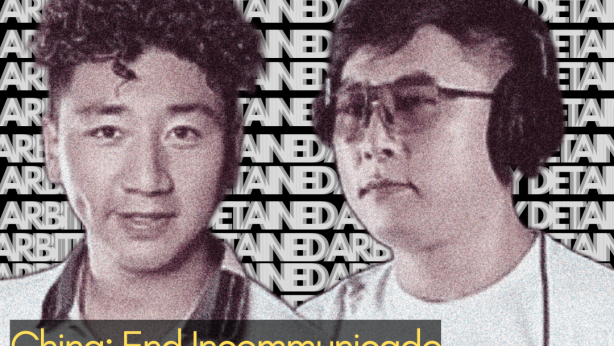NGO’s forcible closure drives founder into exile
One of the founders of a Tibetan grassroots organization that was forcibly shuttered in late 2010 by the Chinese authorities in Gansu Province has escaped into exile after spending a year and a half under constant surveillance.
Sonam Gyatso, 32, who was a monk and a traditional medical practitioner at Dakar Monastery in Sangchu (Chinese: Xiahe) County of Kanlho (Chinese: Gannan) Tibetan Autonomous Prefecture, Gansu Province, founded Phakey Dhodam Tsenchung (English: Society for the Preservation and Promotion of Tibetan Language) that had spearheaded various educational and environmental activities. Gyatso founded the organization along with three other fellow monks from the same monastery.
Before its sudden closure by the local authorities, the organization has carried out various activities including steps to increase literacy among local population and protecting the environment.
Speaking to TCHRD, Gyatso said he and three other founders of the organization had been particularly concerned over the marginalization of Tibetan language and the intrusion of Chinese words into Tibetan lexicon especially among younger Tibetans many of whom had begun using Chinese words when speaking Tibetan, such as saying xing qi yi (Chinese for Monday) instead of the Tibetan word Za Dawa.
In November 2009, Phakey Dhodam Tsenchung was founded and on 23 November, the organization began holding classes in all 14 villages in the County teaching Tibetan language and subjects related to traditional Tibetan culture. The classes were held when the government schools in the area closed for month-long vacation during summer and winter. Over a thousand Tibetan children were enrolled in these schools. The school instructors collected over 200 newly-invented Tibetan words to describe modern discoveries and objects to include in the school curriculum.
On 24 March 2010, Gyatso held a public meeting to discuss ways and means to protect the environment of Sangchu area. This public meeting was held after a section of local people approached Gyatso, whose work in holding Tibetan language classes was well known, to organize activities in the field of enviromental protection. At the public meeting, it was decided to observe 1 April every year as ‘Sangchu Environment Day’. Following the meeting, local people pasted pamphlets all over the area calling on fellow villagers to refrain from careless disposal of polythene and other waste materials, to conduct mass cleanliness drive and not to let anyone whether locals or outsiders engage in activities harmful to the environment.
On 29 March 2010, a group of officials from the Township government office interrogated Gyatso asking him about the nature and work of the organization. Gyatso was also pressured to stop using the organization’s name or to change it into something that would reflect that it was backed by the government. Gyatso refused the latter suggestion but took care from then on not to use the original name prominently when carrying out future projects.
In July 2010, the organization introduced a project to reduce illiteracy by getting literate villagers to teach Tibetan language to illiterate villagers. The project proved successful managing to involve many villagers.
On 7 December 2010, Gyatso was again questioned by a team of seven officials from the County office. The County officials were fully aware of the various educational and environmental projects undertaken by the organization and asked Gyatso about the organization’s membership, funding sources and advisors, if any. Gyatso denied the involvement of any advisors and told his interrogators that the activities undertaken by the organization were not against the law and added that in fact, the law itself called on citizens to carry out such projects for the benefit of the larger community. The officials in turn responded that it was illegal to found organizations without official approval and threatened that if they continue with their activities, Dakar Monastery to which many of the organization’s founders belonged, would be investigated.
The next day, on 8 December, about 20 officials from the County government office arrived at Dakar Monastery and divided the monastery’s 80 monks into six groups and forced them to attend ‘patriotic re-education’ classes for about two weeks. At these political education classes, monks were made to study a new document called “Regulation on Management and Control of Dakar Monastery”. Each monk was forced to sign a letter expressing their ‘loyalty and love for the Chinese motherland’. The political education campaign at Dakar ended on 17 December 2010.
On 8 December 2010, local authorities had closed down Phakey Dhodam Tsenchung and with that another locally-founded Tibetan organization lost the opportunity to contribute to the welfare of the Tibetan community at large.
Since then, Gyatso and three other founders of the organization, all monks from Dakar Monastery, had come under constant surveillance of the government officials. Special teams of officials belonging to various Party and government units were appointed to monitor and control the movements and activities of Gyatso and fellow monks namely, Tashi Gyatso, Jamyang Sonam and Khenrab. Each monk was under the surveillance of three officials, according to a document received by TCHRD. There were officials from local offices and departments such as Township-level United Front Work Department, Communist Party branch of Kangcha Township, Monastery Management Committee of Dakar Monastery, County Religious Affairs Bureau, and Kangcha Township government. The constant surveillance and threat of sudden arrest eventually forced Gyatso to escape Tibet.
Sonam Gyatso was born in Rinchen nomadic village in Gyengya Township of Sangchu County. He became a monk at a young age at Dakar Monastery. In 2005 he studied Tibetan poetry and astrology for a year at a privately-run school called Ragya Sherig Norling Lobling and in 2006, he studied Tibetan medicine for three years at a private medical school in Malho County, Qinghai Province. He later returned to Dakar Monastery where he continued his religious studies and at the same time acted as a resident medical pratitioner, looking after the patients at the Monastery.


